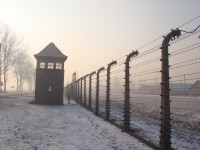Statement on the occassion of European Day of Remembrance of the victims of all totalitarian and authoritarian regimes

Today we remember the victims, survivors and their families, all of whom deserve recognition of their suffering and solidarity of the society as a whole. In Croatia today we still feel consequences of the crimes committed during the Second World War and in its aftermath, and of numerous post-war unjust political processes.
After the occupation by German Nazi and Italian fascist regime of the entire territory of the Kingdom of Yugoslavia, the Independent State of Croatia was established under the leadership of Ante Pavelić. By the end of 1941, the Ustashe authorities had already started with mass killings of Jews, Serbs and the Roma, as well as Croats who were regarded as ideological enemies. The mass killings started through criminal actions of the ustashe forces in Gudovac, Glina and other locations in Banija, in Jadovno and Slana death camps, and in the first camps of the Jasenovac complex near the village of Krapje.
On May 15, 1945, seven days after the capitulation of the Third Reich, remnants of the Ustashe, Chetnik, Home Guard Army, and White Guard movement surrendered near the town of Bleiburg to the army of Great Britain. Together with those forces, a large number of civilians was also withdrawing, many of which were forced to accompany the Ustashe army. Both war prisoners and civilians were passed to the People’s Liberation Army of Yugoslavia and returned to Yugoslavia's territory. During this withdrawal, in fury of revenge, many of the war prisoners were killed without being prosecuted, together with many civilians.
We find that victims of this march, today in Croatia known as the Way of the Cross should be properly recognized and shown piety. Therefore, we invite the Croatian Parliament, after reaching a decision on termination of sponsorship over the commemoration in Bleiburg, to choose, in consultation with academic institutions, relevant organizations and representatives of victims’ families, an appropriative location in Croatia and an appropriate commemorative practice.
We condemn every act of relativization of crimes and call for quicker establishing of facts about every crime, including the genocide over Jews, Serbs and the Roma, crimes committed along the Way of the Cross and investigation of destinies of political prisoners imprisoned at the island of Goli otok and similar prisons, due to the crime of thinking differently. We also invite the Ministry of culture to start a scientific debate dedicated to adoption of a long-term development politics of the culture of remembrance, which would include reconstruction of highest priority antifascist monuments. We also invite the Ministry of Science, Education and Sports to initiate development of both formal and informal education programs, which would be based on the destinies of victims.
Crimes concealed for decades, about which very little has been written until the end of the 1980s, have not been properly investigated until today. Every day we witness political manipulation, reducing or oversizing the numbers of victims and their instrumentalization for the purpose of daily politics. We believe that we owe respect to all victims, and to new generations we educational programs based on facts, in order to enable them to recognize ideas and movements which aim at violation of human rights and freedoms, and to teach them to oppose these ideas before they turn into crimes. We invite the Croatian government to allocate additional budget funds needed for necessary research and all relevant institutions to develop programs of the culture of remembrance and to use, in a more quality, way European programs devoted to the memory of victims.




